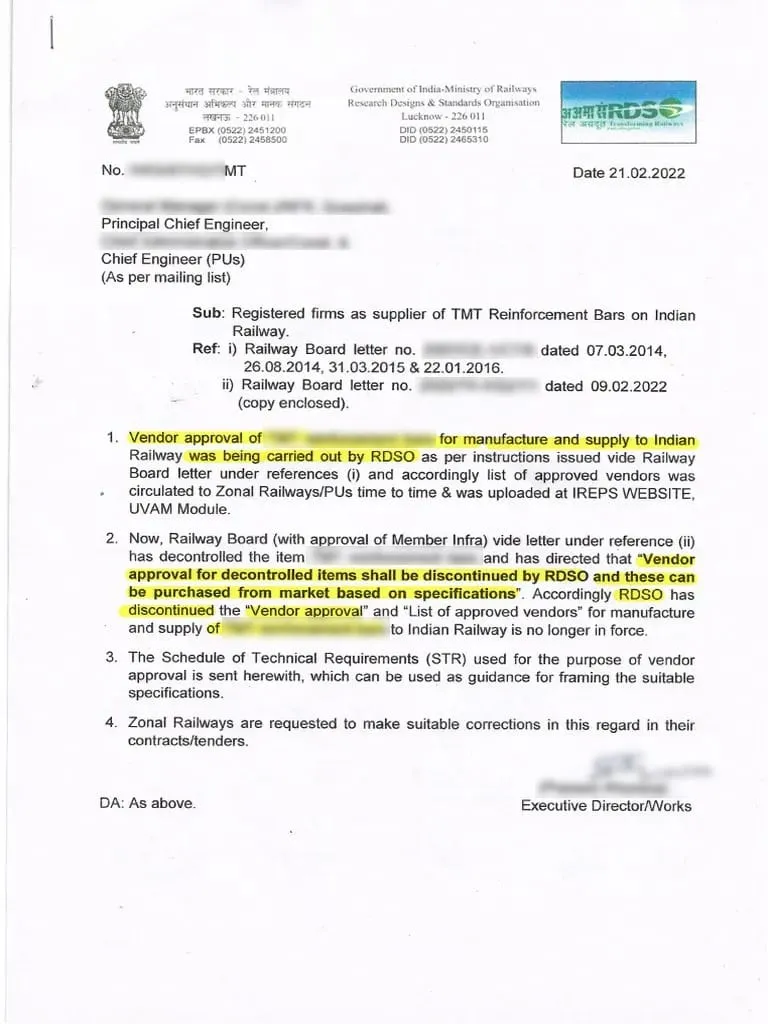
Updated on April 24, 2025 05:05:48 PM
RDSO registration for testing is an important process for checking the quality, safety, and performance of products used in Indian Railways. Before any product is approved for use in railway projects, it must go through a detailed testing process as per RDSO rules.
The Research Design and Standards Organization (RDSO), working under the Ministry of Railways, is responsible for setting testing guidelines and procedures. Testing makes sure that railway products follow the required standards, work properly, and can be used safely in real railway conditions.
Testing under RDSO applies to a wide range of railway products, including Testinging equipment, telecommunication systems, electrical items, mechanical components, and track-related materials. Each product has to go through different types of tests like type tests, routine tests, acceptance tests, and field performance tests based on what kind of product it is.
Manufacturers or vendors applying for RDSO registration must submit their product samples for testing along with detailed technical documents, drawings, and compliance certificates. RDSO reviews all submissions and conducts testing either in its own laboratories or at approved third-party labs. In some cases, on-site testing is also carried out to check how the product works in actual railway operations. Testing makes sure that products are safe to use, work well, and can last for a long time in tough railway conditions. Only after successful testing and compliance verification will RDSO approve.
RDSO Certificate [Sample]

The RDSO Certificate is an official approval issued by the Research Designs and Standards Organization (RDSO), which works under the Ministry of Railways, Government of India. Headquartered in Lucknow, RDSO sets the quality and safety standards for all products, equipment, and services used by Indian Railways. Getting an RDSO Certificate means that a company’s products or services have been checked and approved as safe and good enough to be used in railway operations. Having an RDSO Certificate helps a company build trust and a good reputation with Indian Railways. It also increases the chances of getting government projects. This certificate ensures that railway services in India are safe, strong, and better for people.

Entities supplying goods to Indian Railways can benefit significantly from RDSO vendor approval in the following ways:

Once registered, vendors can log into their profiles via the RDSO vendor portal. This platform enables them to track their application status, update company details, and access the official list of approved vendors published by the Research Designs and Standards Organization.

To obtain an RDSO certificate online for Testing, make sure all required documents are in order and perform a regular RDSO registration check to monitor progress. Here’s a step-by-step process to obtain an RDSO certificate for Testing:

The documents required for Research Designs and Standards Organization (RDSO) Registration Online for Testing may vary based on the product category and the type of vendor registration. Below is a comprehensive list of documents typically required:

Here are the key compliance requirements for Research Designs and Standards Organization (RDSO) Registration for Testing in India:

The Govt fee for RDSO Registration is as follows:
| Firm Type | Fee Range |
|---|---|
| Indian Firms (Micro & Small) | ₹1.5 lakh to ₹10,000 |
| Firms other than Micro & Small | ₹2.5 lakh to ₹15,000 |
| Foreign Firms | $12,000 to $500 |
Note:- Professional fees for the RDSO Certificate is ₹ only with Professional Utilities.

RDSO registration ensures compliance with railway standards, requiring periodic renewal to maintain vendor approval and continue supplying to Indian Railways.
Failure to renew may lead to removal from the RDSO vendor list.

Conclusion
RDSO registration for testing is very important for companies that want to supply products to Indian Railways. It ensures that the products meet safety and quality standards set by RDSO. Once registered, vendors can take part in railway tenders and supply their approved products. To get your RDSO certificate now, consult Professional Utilities. Our team of experts will guide you through each step of registration. It helps build trust, improves product quality, and opens new business opportunities in the railway sector. Also, vendors must renew their registration regularly to continue their approval. Getting RDSO registration makes it easier for companies to grow their business with Indian Railways.

At Professional Utilities, we leverage our industry knowledge and expertise to help businesses navigate complex regulations, minimize risks, and optimize operations for maximum efficiency and profitability.






Frequently Asked Questions (FAQs)
RDSO registration for testing is the approval process to check product quality, safety, and performance for use in Indian Railways projects.
Manufacturers or vendors supplying products like railway equipment, components, or materials to Indian Railways need RDSO registration for testing and approval.
You can apply online on the official RDSO portal by submitting necessary documents, product details, and completing the registration form for verification.
Products like signaling equipment, telecom systems, electrical items, track materials, and mechanical components require RDSO testing before railway usage.
RDSO testing ensures that only safe, reliable, and high-quality products are used in railway operations, reducing risks and improving performance.
RDSO registration is usually valid for 2 years. Vendors must renew it by fulfilling compliance requirements before the expiry date.
Once approved, vendors can supply their tested products to Indian Railways, participate in tenders, and increase business opportunities in railway projects.
Yes, RDSO registration can be renewed after a compliance check to ensure products still meet Indian Railways' safety and quality standards.
Speak Directly to our Expert Today

Reliable

Affordable

Assured
Industries Served by Professional Utilities
Apparels
Footwear
Furniture
Gems and Jewellery
Tourism & Hospitality
Consumer Electronics
Chemicals
Telecom
Oils & Gas
Hotel
Railways
Liquor
Health & Medical
Food Processing
Dangerous/ Haz. Goods
Tea & Coffee
Capital Goods
Recycling
Rubber
NGOs
Silk
Handloom
IT & BPM
Steel
Automobile
Tobacco
Constructions